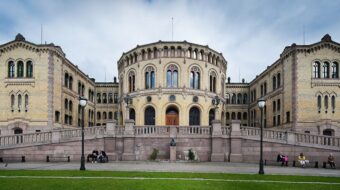
Venezuela: Solidarity = medical education
Venezuela’s Latin American School of Medicine last week welcomed 411 young people from 11 nations entering upon a free six-year medical education course. Posted to locations throughout the country, they will follow a curriculum combining study with clinical work.
Last year marked the opening for a school modeled on its counterpart in Cuba, now eight years old, which has produced some 4,500 graduates. Planning for the school followed a 2005 agreement between President Hugo Chavez and then-Cuban President Fidel Castro to prepare 200,000 new physicians for Latin America and the Caribbean over 10 years.
“We are still fulfilling our commitments for solidarity and integration,” President Chavez told the students, according to Prensa Latina.
Iraq: U.S. military jails children, report charges
In a May 21 press release, Human Rights Watch charged U.S. military forces in Iraq with imprisoning 513 children. Designated “imperative threats to security,” many had been interrogated beforehand by U.S. troops.
The report came a week before the UN Committee on the Rights of the Child meets to review U.S. compliance with treaty obligations.
Over five years, U.S. forces have jailed 2,400 children — some only 10 years of age — for an average of 130 days, and a few for over a year. Some of those discharged end up transferred to abuse-ridden Iraqi jails. Less than a third receive educational services.
The U.S. and Somalia, alone in the world, have yet to sign the UN Convention on the Rights of the Child.
Philippines: Activists see less role for coal
While environmental ministers discussed climate change in Kobe, Japan, May 24, the Greenpeace ship Rainbow Warrior blocked coal shipments to the Pagbilao coal-fired power plant in Quezon Province, Philippines.
Plant expansion is seen as adding an additional 5 million tons of carbon dioxide annually to the atmosphere. The Greenpeace web site said protests were also directed at government plans to build eight new coal-fired power stations.
Joey Sarte Salceda, governor of Luzon’s Albay province, has designated his province as a coal-free zone. Analysts point out that energy transmission in the Philippines is beset with waste and that the nation’s eight coal-fueled power plants presently account for 36 percent of carbon emissions there.
Italy: Green light for persecution
Italian Prime Minister Silvio Berlusconi’s first cabinet meeting since his re-election called for expulsion of citizens of other European Union nations, especially if their living conditions are deemed unacceptable. At the May 21 meeting, the government authorized confiscation of properties and designated child begging and irregular entry as crimes.
The week before, mobs expelled Roma people from a Naples camp, burning caravans and buildings. Police rounded up 286 alleged foreign criminals that Berlusconi likened to “an army of evil.”
“People are going to do what the political class cannot,” opined Umberto Bossi of the Northern League party, a Berlusconi ally.
The Rome Daily News reported on a recent survey showing 68 percent of Italians calling for all 150,000 Roma people — half of them citizens — to be expelled.
Niger: Report highlights disparities
Ten countries in sub-Saharan Africa, with Niger at the bottom, were shown this month by Save the Children to be the world’s most dangerous places for mothers and children. They are included among countries where “one in 21 mothers will die … from pregnancy-related causes [and] one child in six dies before her fifth birthday, and roughly one in three suffers from malnutrition.”
Five Nordic countries rank among the 10 safest places for children and their mothers. The United States dropped to 27th place.
Cuba: Energy revolution bears fruit
In a report this month to the National Assembly’s newly formed Energy and Environment Committee, Vicente de la O, an executive with Cuba’s Union Electrica power company, declared that in less than three years, Cuba has saved 961,419 tons of fuel.
Some 39 percent of the savings result from replacing inefficient refrigerators with low energy consuming models imported from China. Other factors include modernization of electrical generating plans, the use of energy-saving light bulbs, and reduced electrical transmission wastage.
The Cuban paper Periodico26 reported the official’s observation that from 224 blackout days in 2005, Cuba has progressed to none over the past 18 months.
World Notes are compiled by W.T. Whitney Jr. (atwhit@roadrunner.com)











Comments